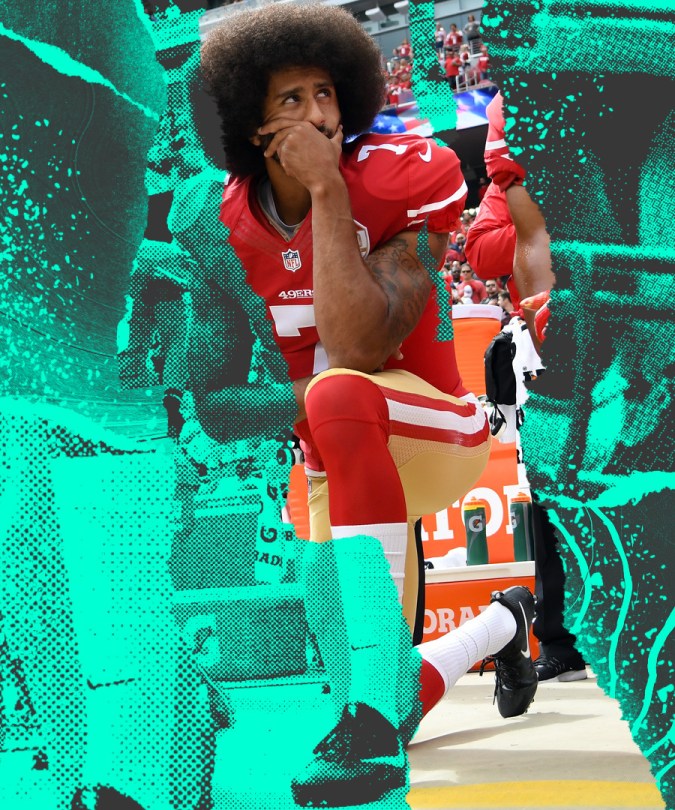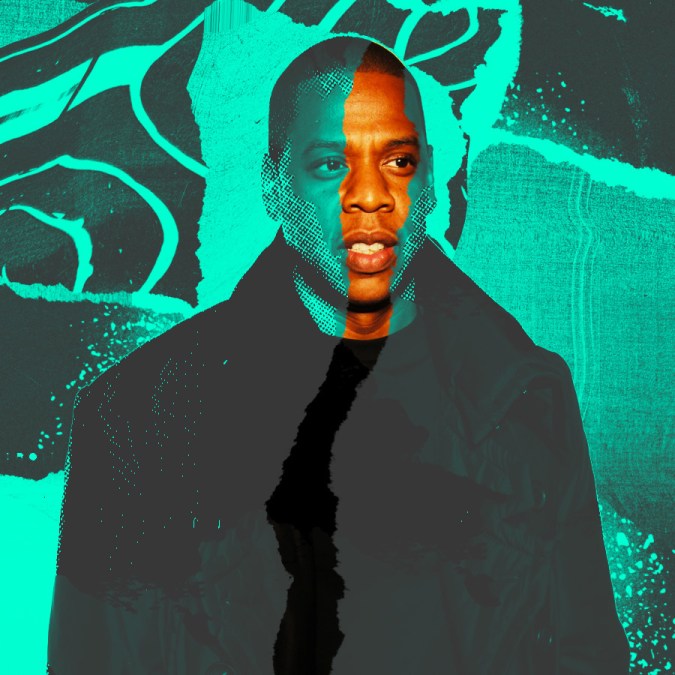Last month, the National Football League announced that Jennifer Lopez and Shakira would be headlining the 2020 Super Bowl Halftime in Miami. Both Latinas are global superstars in their own right, with groundbreaking achievements under their belt.
In a statement to the NFL regarding their performance, Shakira said, “I’m so honored to be taking on one of the world’s biggest stages in the company of a fellow female artist to represent Latinos and Latinas from the U.S. and all over the world — and to top it off, on my birthday! This is a true American dream and we are going to bring the show of a lifetime!”
The concept of this performance representing the “American dream,” though, is debatable. After years of controversy between the NFL, former 49ers quarterback Colin Kaepernick and several other NFL players who’ve protested racial injustice and police brutality on the field, the NFL finally settled Kaepernick’s grievance, but no team in the league has hired him.
The announcement of the two Latina performers headlining the upcoming Super Bowl follows Roc Nation’s partnership with the NFL to launch “Inspire Change” initiatives, as well as curation collaborations for various concerts, including the Super Bowl.

Below, three Black Latinas share their thoughts on the intent behind the Super Bowl halftime performance, JAY-Z’s decision to partner with the league after the organization shunned Kaepernick and the sacrifice of protest.
The NFL Wants the Public to Forget About Colin Kaepernick

by Juliana Pache
“I am not going to stand up to show pride in a flag for a country that oppresses Black people and people of color. To me, this is bigger than football and it would be selfish on my part to look the other way. There are bodies in the street and people getting paid leave and getting away with murder.” In 2016, Colin Kaepernick gave this statement to the NFL after protesting racial injustice by choosing to sit during the national anthem at the opening of a 49ers game.

That same year, just weeks prior, John Carlos, Olympic bronze medal-winner, who raised the Black Power fist at the 1968 Mexico City Olympics along with gold-medal winner Tommie Smith, reflected on the repercussions of their protest in an interview with Vox: “The first 10 years after those Olympics were hell for me. A lot of people walked away from me. They weren’t walking away because they didn’t have love for me or they had disdain for me. They were walking away because they were afraid. What they saw happening to me, they didn’t want it to happen to them and theirs.”
Fast-forward to present-day and Colin Kaepernick, a talented athlete and free agent, is not signed to any team in the National Football League. This year, Kaepernick and former teammate Eric Reid received a settlement from the NFL after the players filed a grievance stating that the league colluded to blackball Kaepernick as punishment for his protest.
Several things are obvious here: The NFL wants Kaepernick’s grievance to go away; Kaepernick is making incredible sacrifices with his protest, which may very well cost him his football career; and, finally, history repeats itself. When John Carlos and Tommie Smith raised their fists in 1968 to protest racial injustice and inequality, they were met with public shaming and ridicule. They were also shunned from athletic opportunities for years to come. History repeats itself.

When JAY-Z and Roc Nation announced their partnership with the NFL to support the league’s Inspire Change “social justice” initiative, I was appalled, furious and confused. The intention behind the launch of this partnership is directly correlated to the public perception of the NFL following the controversy with Colin Kaepernick, as is made evident by JAY-Z’s “I think we’ve moved past kneeling” comment.
By suggesting that these two for-profit companies, Roc Nation and the NFL, coming together to perform what is essentially a massive PR campaign, is somehow more progressive than “kneeling,” the Brooklyn mogul is not only dismissing Kaepernick’s activism and philanthropic endeavors, he is making invisible that which afforded him the opportunity to partner with the NFL in the first place. It is a manipulative stance to promote, and its intent is to make the NFL and Roc Nation’s social justice initiatives appear more legitimate than Kaepernick’s.
With all things considered, the NFL can do a lot of “good” with their resources. They can fund programs, support community activism, select Latinas to perform at the Super Bowl halftime, and it will still be true that they are a corrupt organization that blackballed a Black athlete for speaking up about racial injustice and police brutality.

Jennifer Lopez and Shakira, two massive global superstars in their own right, are arguably excellent choices to headline any major event. Two Latinas performing at the Super Bowl halftime may feel like a cause for celebration for some (and perhaps, in some ways, it is), but for others, it could seem like another disingenuous tactic employed by the NFL. As a Black Latina, I do not feel like this is worth celebrating. To be fair, if any artist, of any demographic, performed the Super Bowl halftime, I still wouldn’t feel like it was a win because it fails to address what really matters: Why doesn’t Kaepernick have a job? Is JAY-Z working on it? Will J.Lo and Shakira put in a good word for him?
With NFL Partnership, JAY-Z Chose Capitalism Over Community

JAY-Z has inspired many. To witness a late-bloomer rapper from Marcy Projects evolve into a business mogul, starting record labels (Roc-A-Fella Records in 1995, and later Roc Nation), urban clothing line Rocawear, the sports bar and restaurant 40/40 Club and streaming platform Tidal, it’s hard not to want to root for him – at least from an entrepreneurial standpoint. Jay’s even been critical of the criminal justice system and funneled his criticism in new ways through projects like Time: The Kalief Browder Story, a miniseries he executive produced; Meek Mills’ The Reform Alliance, an initiative aimed at reducing the number of people affected by parole and probation law and his public support of Colin Kaepernick. Jay even passed on performing at the Super Bowl, which he mentioned on the lead single off his joint album Everything Is Love with his wife Beyonce, “Apeshit.” I assumed it was in solidarity with Kaepernick.

So, when news surfaced that Jay brokered a long-term partnership between Roc Nation and the NFL, I, like many of my peers on social media, felt sick. The thought of Jay supporting and profiting from an institution that purposefully halted the career of another Black man, who he, again, supported, is disappointing. His comments from the early August announcement – when he sat next to NFL commissioner Roger Goodell – were tone-deaf and dismissive.
“We have moved past kneeling,” the 49-year-old said, following that comment with a mention about “actionable items.” But those actionable items that each were set to tackle were unclear. There was talk about the connection between entertainment and change, as well as Jay and the NFL’s shared vision for “inspiring meaningful social change across our country.” (The latter was mentioned by Goodell.) However, what would this look like? Roc Nation and the NFL’s “Inspire Change” initiative was birthed from the players, yet neither the NFL nor Jay looped in Kaepernick.
The writing was on the wall. Most sports structures are designed to profit off of the labor and talent of Black bodies, while not including them in meaningful, structure-shifting decisions. That’s why it was much easier for the NFL to rid themselves of Kaepernick and create the facade that steps were being made internally to right this wrong. Who better than Jay, who wore a “Colin K” jersey during his Saturday Night Live performance in October 2017, to be the frontman for this?
As a Black Latina born and raised in New York City, it’s hard to watch someone you once respected choose capitalism over community, over justice, over another Black person. We have the free will to choose what works best for us, and Jay made the decision that best aligns with him and his value set.
Outside of the social justice program play, Jay has a say in the direction of the Super Bowl halftime show. Unfortunately, that portion has fallen flat, too. I watched intently online as many non-Black Latinxs rejoiced in learning that Shakira and Jennifer Lopez would headline the forthcoming Super Bowl LIV Halftime Show in Miami. Neither artists are from Miami, yet because Miami is considered a Latin American cultural hub, the chosen two need to represent the media-backed “Latina look” –white or mixed; straight, blonde hair, fine features, and a small, not overbearing frame that showcases some curves. I can’t help but think of Black Latinas from Miami like Trina and Amara La Negra. Though some may argue that they don’t fit the audience or don’t have the scale of previous performers, I’d like to see them on the big stage. They, too, should be considered, but within the scope of Latinidad, there is no place for either. There is no place for visibly Black bodies.
This brings me back to Jay’s decision. If you are going to work in tandem with the NFL, what metrics are we using to measure success? From the current look of things, things have started off on the wrong foot. So, yes, I’m still skeptical.
Non-Black Latinas Are Often Complicit Within Structural Anti-Blackness

I have always been wary of the ways in which white and white-passing Latinas operate in non-inclusive spaces and where their allegiances lie. Many times, I have been disappointed to realize that they function from a place of privilege they wish to pretend does not exist at the expense of Black and Indigenous women.
Before we analyze Jennifer Lopez and Shakira’s upcoming Super Bowl halftime performance – which follows the NFL’s controversial decision to shut down Colin Kaepernick’s protests for #BlackLivesMatter and racial justice – we must first address that J.Lo and Shakira are both easily digestible Latinas who may face xenophobia but will never understand the oppression of racism. An added layer is that they are both wealthy singers who, via their lineage, have profited off of their proximity to whiteness, which allows them to superimpose themselves as the stereotype of what media wishes every Latina looked like.
As a Black woman, I don’t feel represented by J.Lo nor Shakira, and due to their brand of aligning themselves with what is more profitable and not necessarily what is best for equality and social justice, I feel strongly that their silence is complicit in the very systems that create a social hierarchy based on proximity to whiteness. Furthermore, these same systems and corporations wish to only work with people who “behave” and don’t question injustices or discriminatory acts. This has been proven through Colin Kaepernick’s stalled career as he is still being ousted for standing up for his moral values. This is clear when we look at the NFL’s partnership with JAY-Z’s Roc Nation, which asserts that we have “moved past kneeling” and instead promotes ideals that only help to bandage a deep-punctured wound.
There are many layers to this conversation, as we are not only discussing race, but we are also discussing how hyper-wealthy celebrities, more often than not, choose profit over people. Not only do J.Lo and Shakira operate from a privileged space as white-passing Latinas, but they also operate from the 1% of citizens who are able to use capitalism to hoard wealth at the expense of the rest of us.
The concept of Latinidad limits the ways in which we can address marginalizations because this geographical term is not yet expansive enough to address race, class, nationality and gender. In order for us to truly dig deeper into how colonialism has left many Black and Indigenous people disadvantaged, we would have to dismantle the systems that willingly or unknowingly uphold white-supremacist-patriarchal agendas. Unfortunately, megastars like J.Lo and Shakira have profited greatly from those same systems and don’t plan on giving up those privileges, nor do they care to. The Super Bowl is just one more example of that.
It would’ve been a truly powerful moment for the Latinx community if two white-passing Latinas with the social and economic capital of J.Lo and Shakira had stood up and aligned themselves as allies to the Black community and rejected an offer to perform at the Super Bowl. Unfortunately, moments like these continue to prove that there is a lack of solidarity within Latinidad and much of it has to do with race.




